Your organization could save up to 30% on software spending with the right ITAM software. Why waste thousands on unused IT assets?
That’s not just a stat—it’s a wake-up call. Somewhere in your stack, licenses are quietly expiring. Subscriptions are auto-renewing. Devices are collecting dust. And money’s walking out the door.
This is where IT Asset Management (ITAM) software earns its keep. The good ones don’t just track what you own—they tell you what’s worth keeping, what’s not, and what’s falling through the cracks. With the market expected to hit $2.9 billion by 2032, it’s clear more teams are ditching the spreadsheets and getting serious about visibility.
Modern ITAM tools now come with baked-in AI: smart alerts for expiring licenses, underused assets flagged for redeployment, and real-time dashboards your CFO will actually want to see. Integrated with service desks, they become a single source of truth—clean, connected, and ridiculously useful.
In this guide, we unpack the top ITAM software for 2025. Open-source to enterprise-grade—we’ve done the legwork. You get the clarity. Let’s get into it.
11 Best ITAM Software Tools in 2025
The fastest way to cut IT costs? Use the right ITAM software.
These tools give you clear visibility into your hardware, software, and cloud assets—helping you cut waste, stay compliant, and save up to 30% on software spend.
Some tools are great at SaaS management, others excel in hardware tracking. The trick is picking one that fits how your team works.
Here are 11 of the best ITAM tools to check out in 2025:
- Teqtivity
- Zluri
- ManageEngine AssetExplorer
- SolarWinds Service Desk
- ServiceNow ITAM
- IBM Maximo
- Asset Panda
- Flexera IT Asset Management
- Ivanti ITAM
- Sapphire
- Asset Sonar
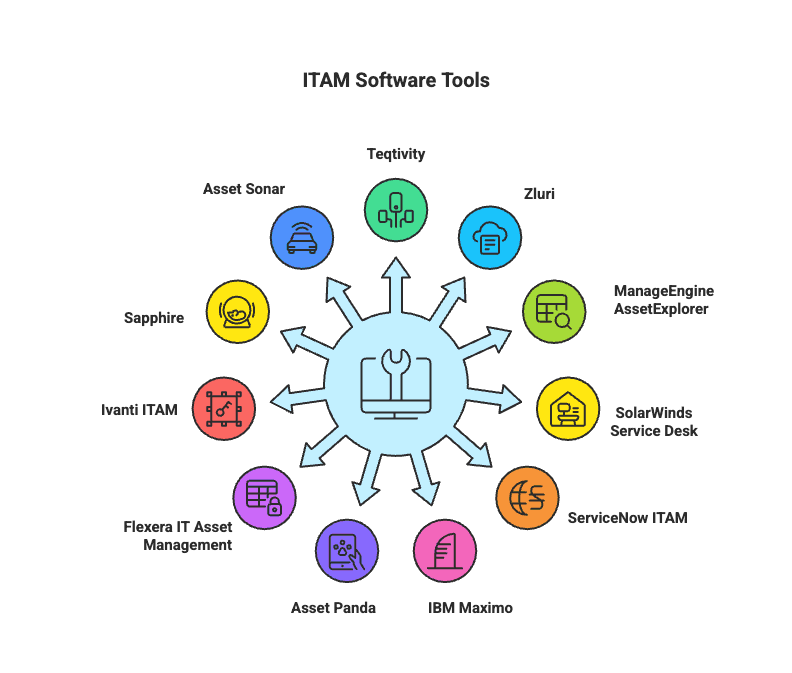
ITAM Software Tools
Let’s get into each of these—and what makes them worth your time (or not).
1. Teqtivity
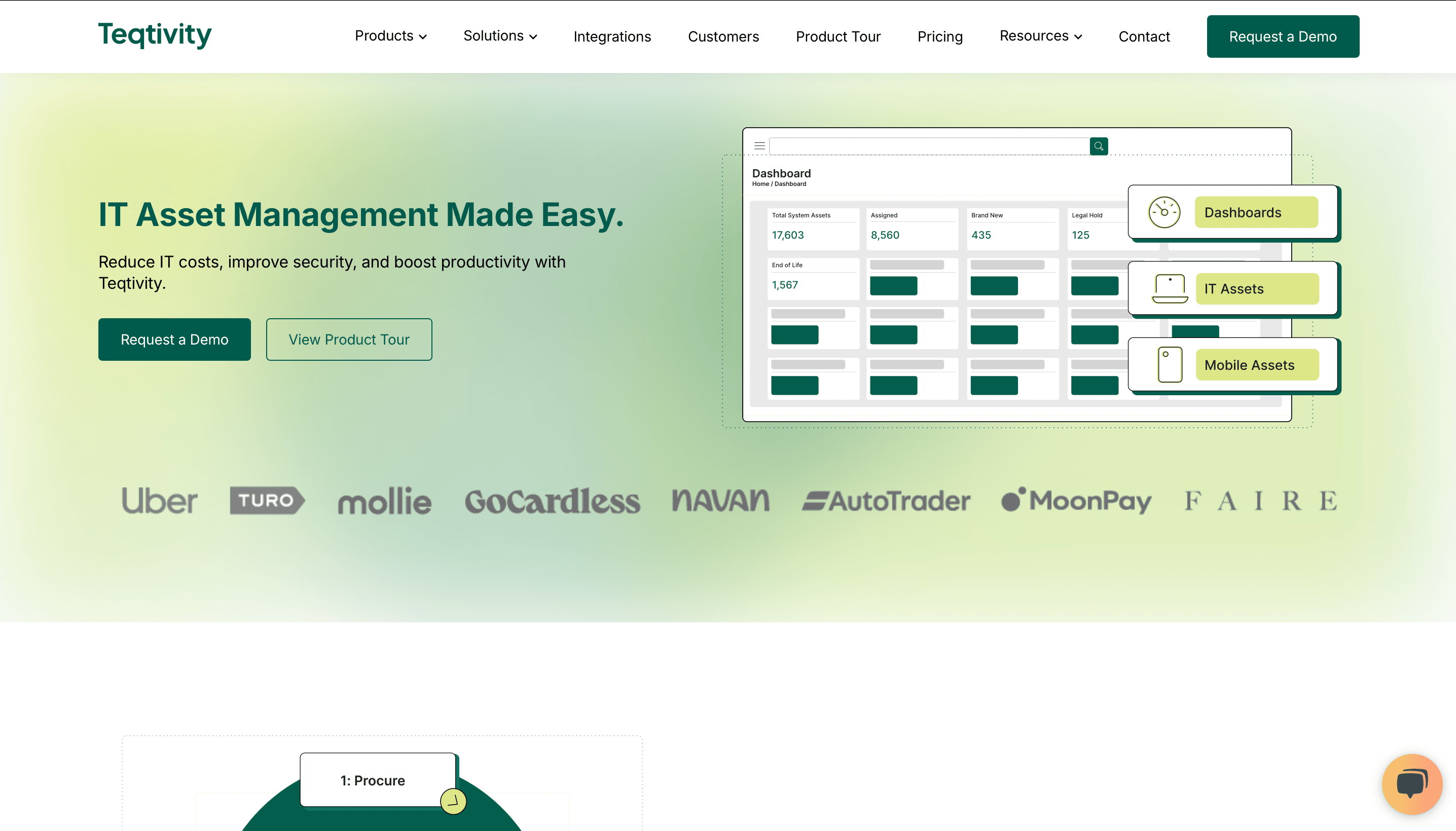
Teqtivity
Teqtivity adapts to your workflows rather than forcing you to change them. Its cloud-based system provides real-time visibility across the asset lifecycle—from purchase to retirement.
Features:
- Tracks everything with customizable fields, reports, and user roles
- Integrates smoothly with MDMs, HR tools, and identity platforms like Okta and BambooHR
- Real-time updates through a cloud dashboard
Pros:
- Flexible enough to support remote, hybrid, and on-site teams
- Strong customization and granular user roles
- Easy integrations with existing IT systems
Cons:
- Limited offline functionality for field teams
- Steeper pricing than some mid-market competitors
Pricing: Starts at $72 per user/month. Growth+ plan adds dedicated support and custom integrations.
Best for: Companies with remote teams and unique workflows that need flexibility and detailed reporting.
2. Zluri
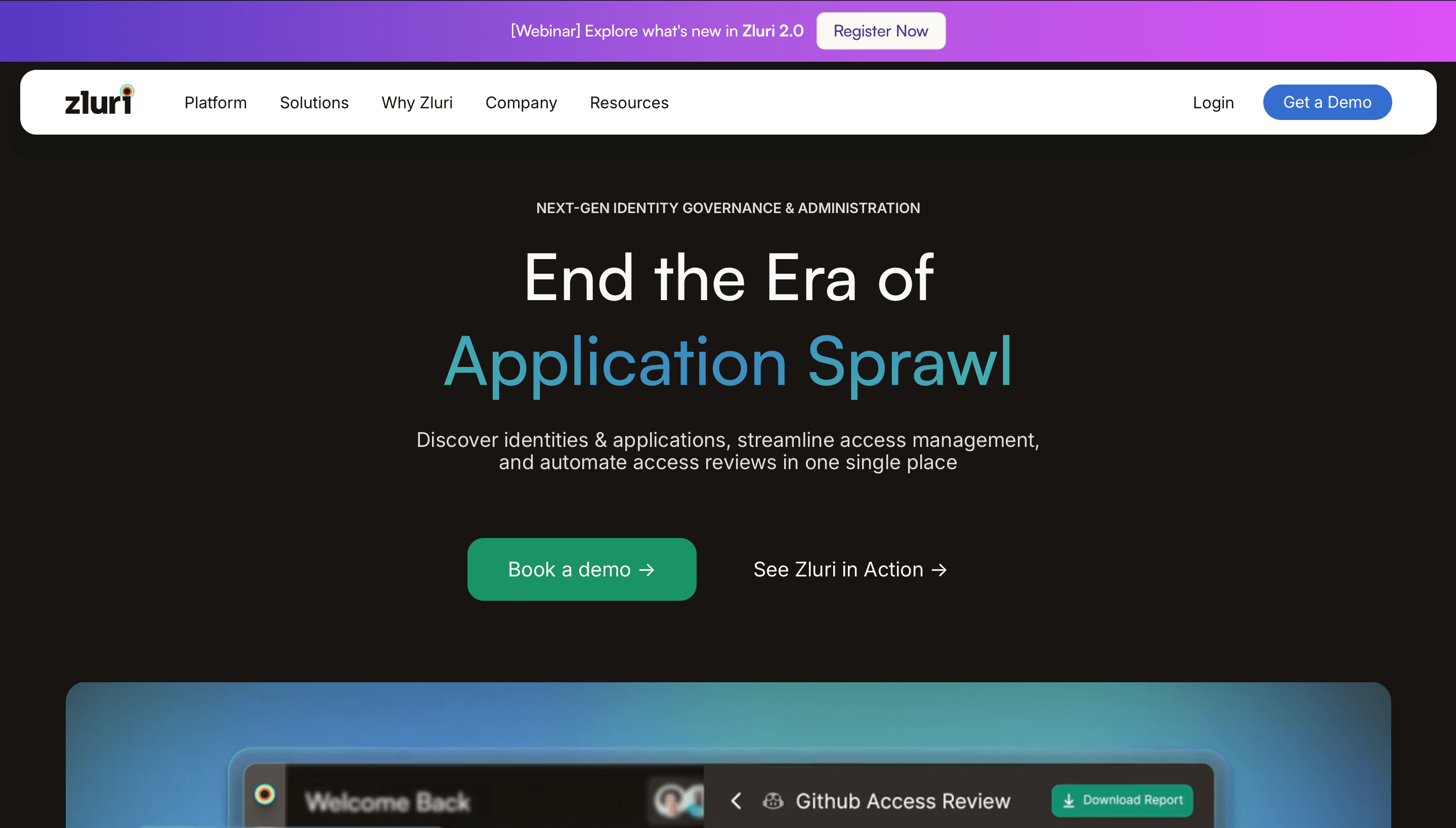
Zluri
Zluri is your SaaS command center. It discovers, maps, and manages cloud apps using nine data sources—from finance systems to IDPs—ensuring zero blind spots.
Features:
- Tracks 100% of SaaS apps with nine discovery methods
- 225,000+ SaaS apps in its library
- Automates onboarding/offboarding and license renewals
- Offers built-in risk scoring and compliance tools
Pros:
- Deep SaaS visibility and spend optimization
- Powerful automation for user provisioning
- Strong compliance tracking features
Cons:
- Requires some setup to configure data sources
- On the pricier side for smaller teams
Pricing: Starts at $4–$8 per user/month. Enterprise contracts average $38K+/year.
Best for: Mid to large companies drowning in SaaS sprawl, shadow IT, and growing compliance needs.
3. ManageEngine AssetExplorer
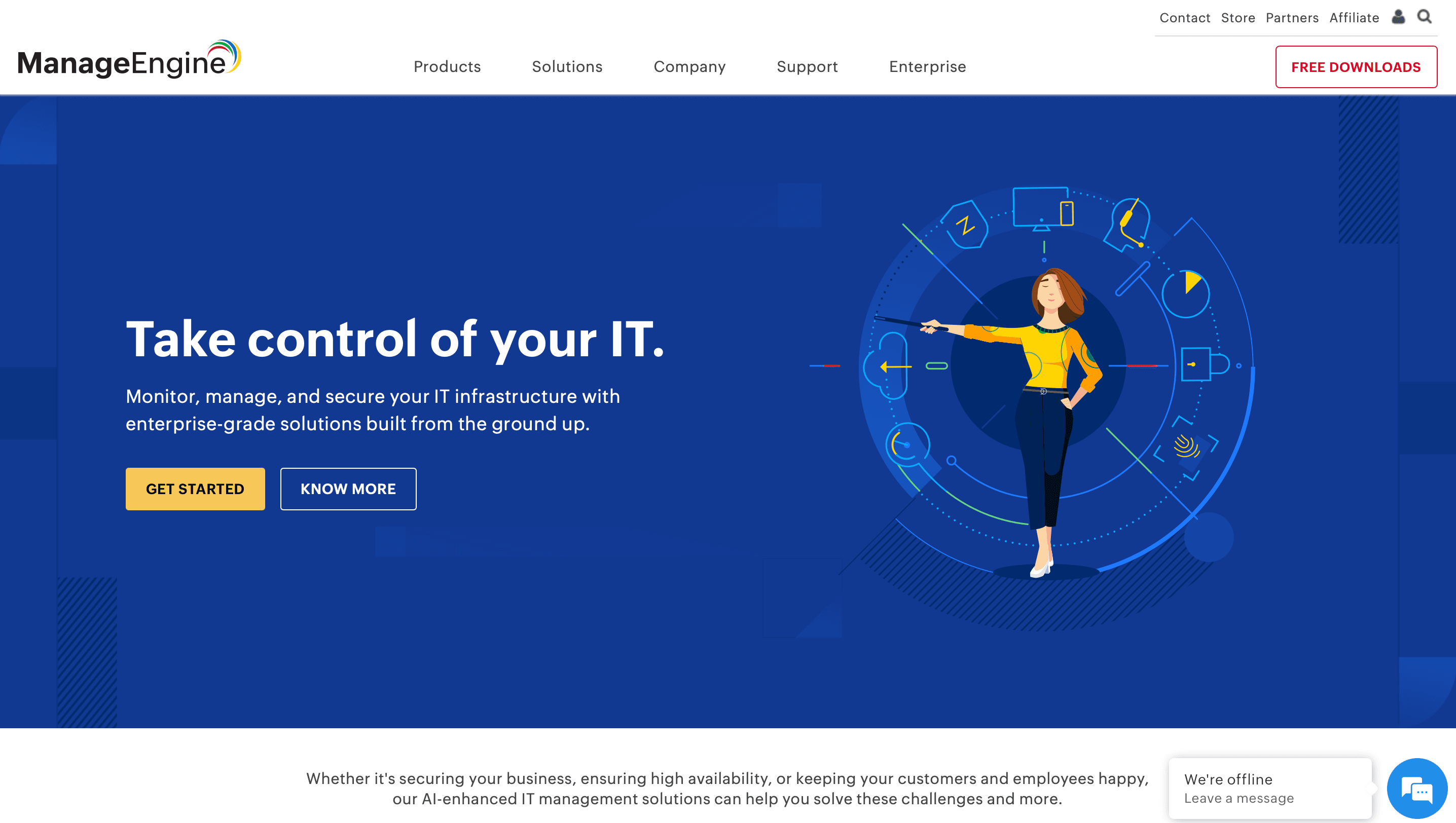
ManageEngine
ManageEngine brings clarity with its agent-based/agentless scanning and integrated CMDB. You can map asset relationships and track lifecycles, even across remote offices.
Features:
- Manages assets from procurement to disposal
- License compliance and contract management
- Mobile app and scheduled reporting
Pros:
- Strong visibility into asset relationships
- Budget-friendly entry pricing
- Local deployment or on-premise options available
Cons:
- Interface can feel dated
- Limited cloud-native support for hybrid environments
Pricing: Starts at $955/year for 250 assets. Free tier available for up to 25 nodes.
Best for: Organizations looking to centralize and streamline asset tracking without breaking the bank.
4. SolarWinds Service Desk
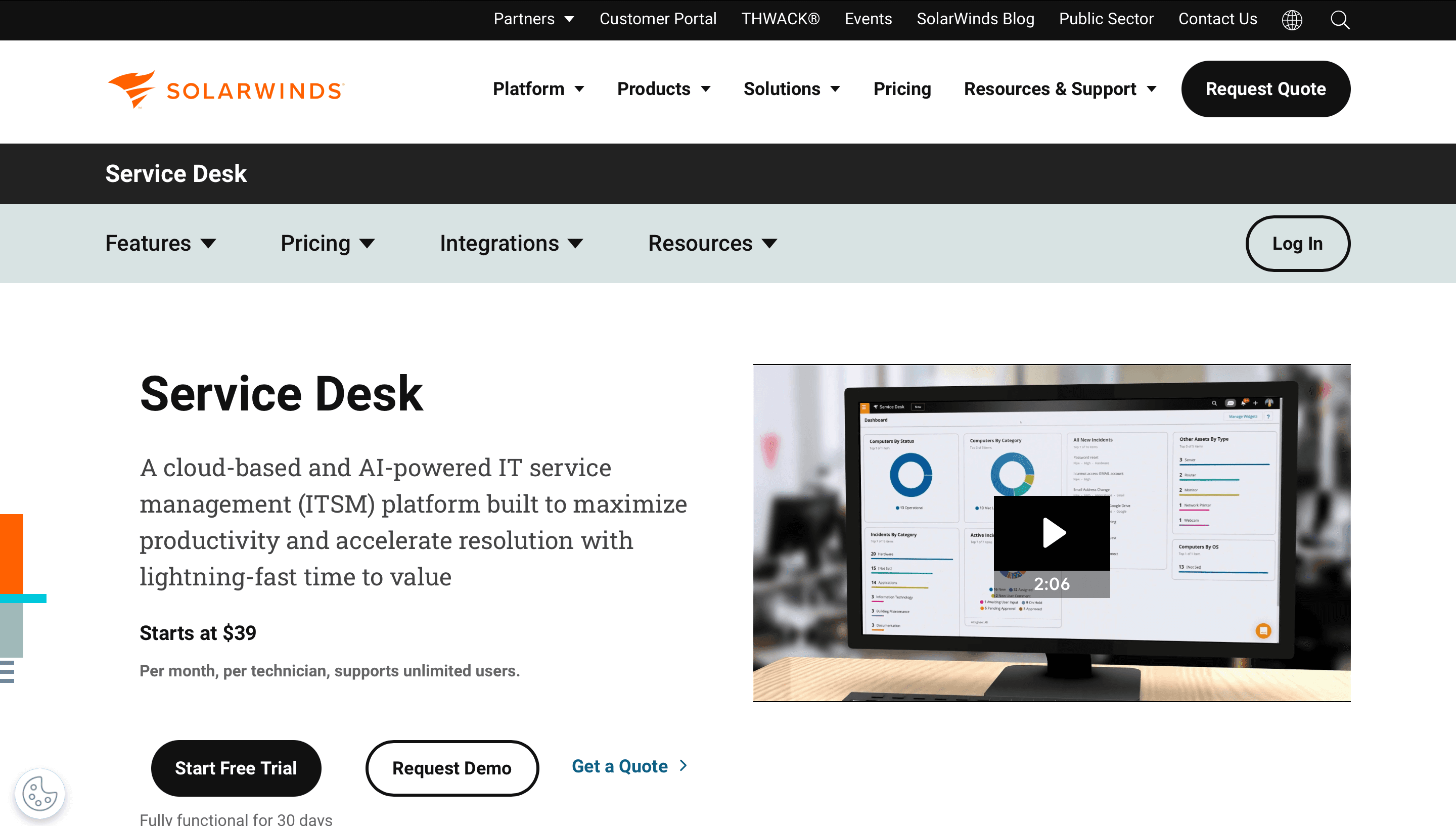
SolarWinds
SolarWinds Service Desk connects asset management directly to service delivery, giving you clear visibility into which hardware or software is linked to each support ticket. It also flags vulnerabilities, helping teams act fast and stay compliant.
Features:
- Integrated service desk with asset lifecycle tracking
- Automatic discovery and tagging
- Proactive compliance and risk detection
Pros:
- Connects assets directly to incident tickets
- Easy setup and clean UI
- Lightweight CMDB with automation
Cons:
- Less advanced asset mapping
- Feature-rich plans get expensive quickly
Pricing: Starts at $39/technician/month. Premier plan at $99/month adds visual CMDB and automation.
Best for: IT teams needing tight alignment between incidents and infrastructure visibility.
5. ServiceNow ITAM
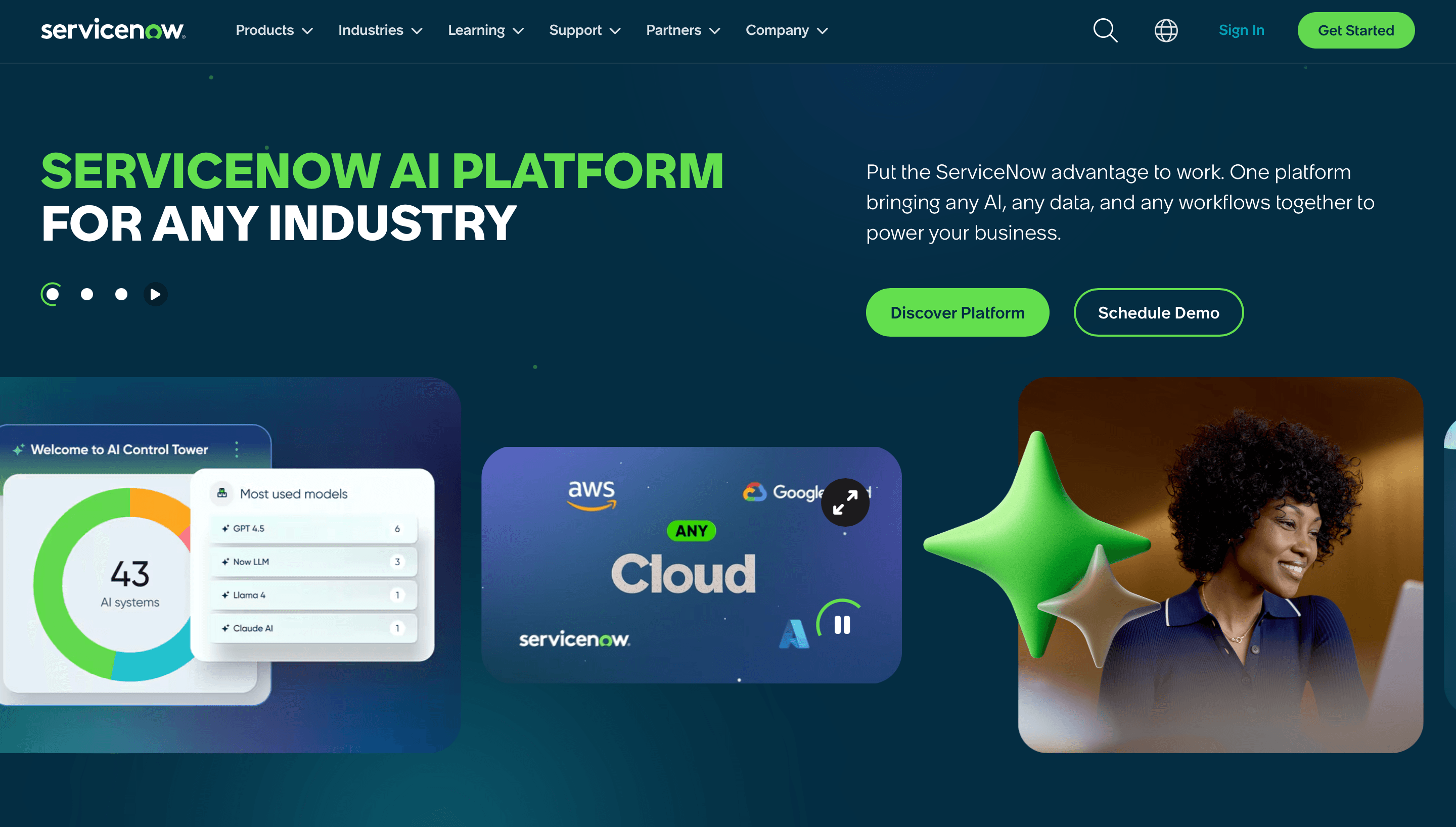
ServiceNow
ServiceNow is the juggernaut of enterprise-grade ITAM. If you’re already on the Now Platform, the integration is seamless—and powerful.
Features:
- Manages software, hardware, and cloud assets
- Automates compliance and cost controls
- Uses a unified content library
Pros:
- Enterprise-scale asset visibility
- Seamless integration with other ServiceNow modules
- Strong automation and governance controls
Cons:
- Expensive and complex for smaller orgs
- Requires a dedicated team to maintain
Pricing: Starts at $100/user/month. Modular licensing based on features.
Best for: Large enterprises using other ServiceNow modules and seeking a single source of asset truth.
6. IBM Maximo
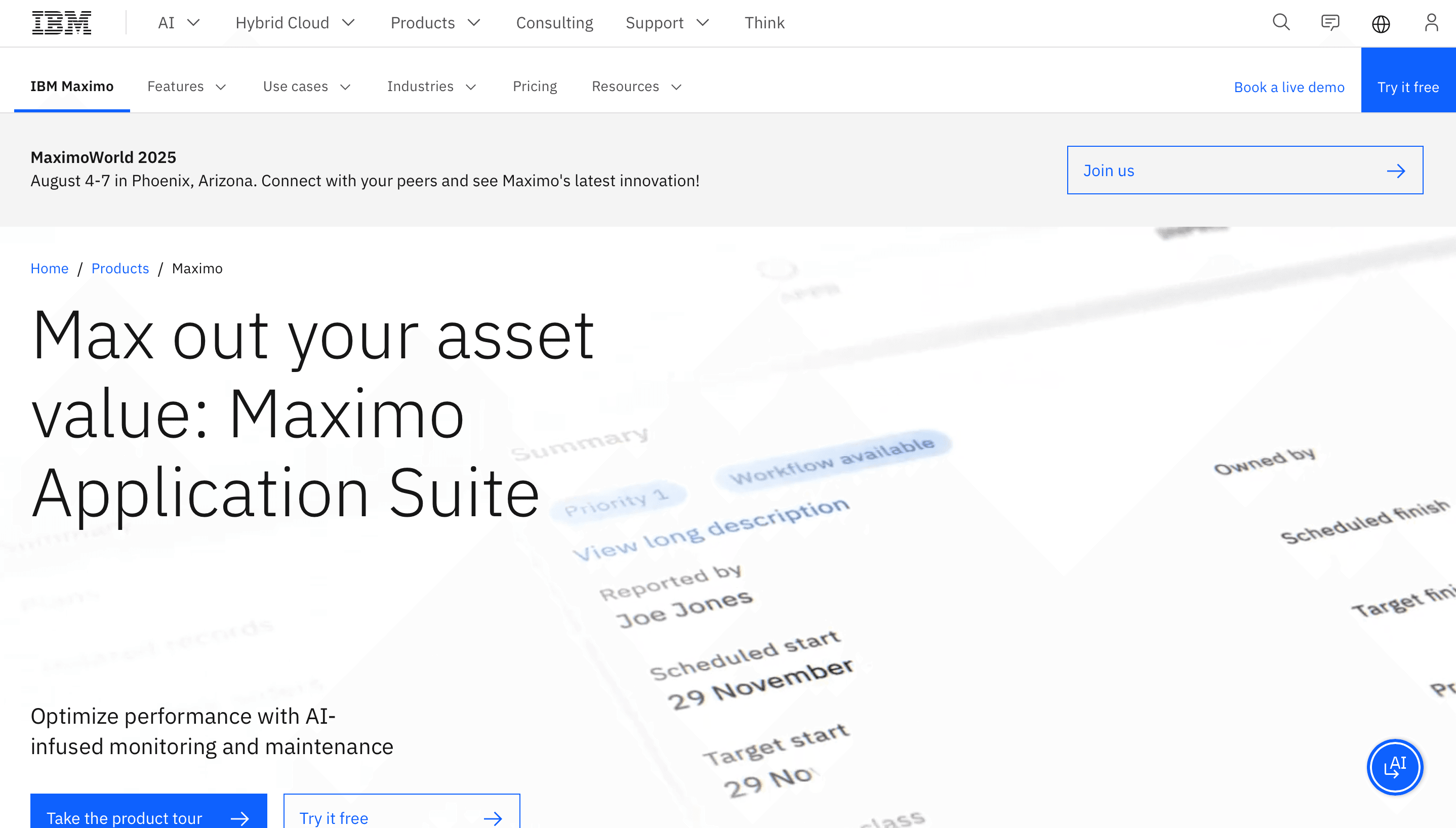
IBM Maximo
IBM Maximo brings industrial-strength ITAM with AI, IoT, and predictive analytics. It’s made for environments where assets are complex, distributed, and mission-critical.
Features:
- AI-driven workflows via watsonx
- IoT integration for real-time health monitoring
- Centralized repository and maintenance scheduling
Pros:
- Best-in-class for industrial/physical asset tracking
- Advanced analytics and automation
- Highly configurable for critical operations
Cons:
- High setup and learning curve
- Overkill for smaller businesses
Pricing: Starts around $40,000/year for 25 users. Premium SaaS options available.
Best for: Asset-heavy industries—think manufacturing, energy, or transportation—needing deep lifecycle insight.
7. Asset Panda
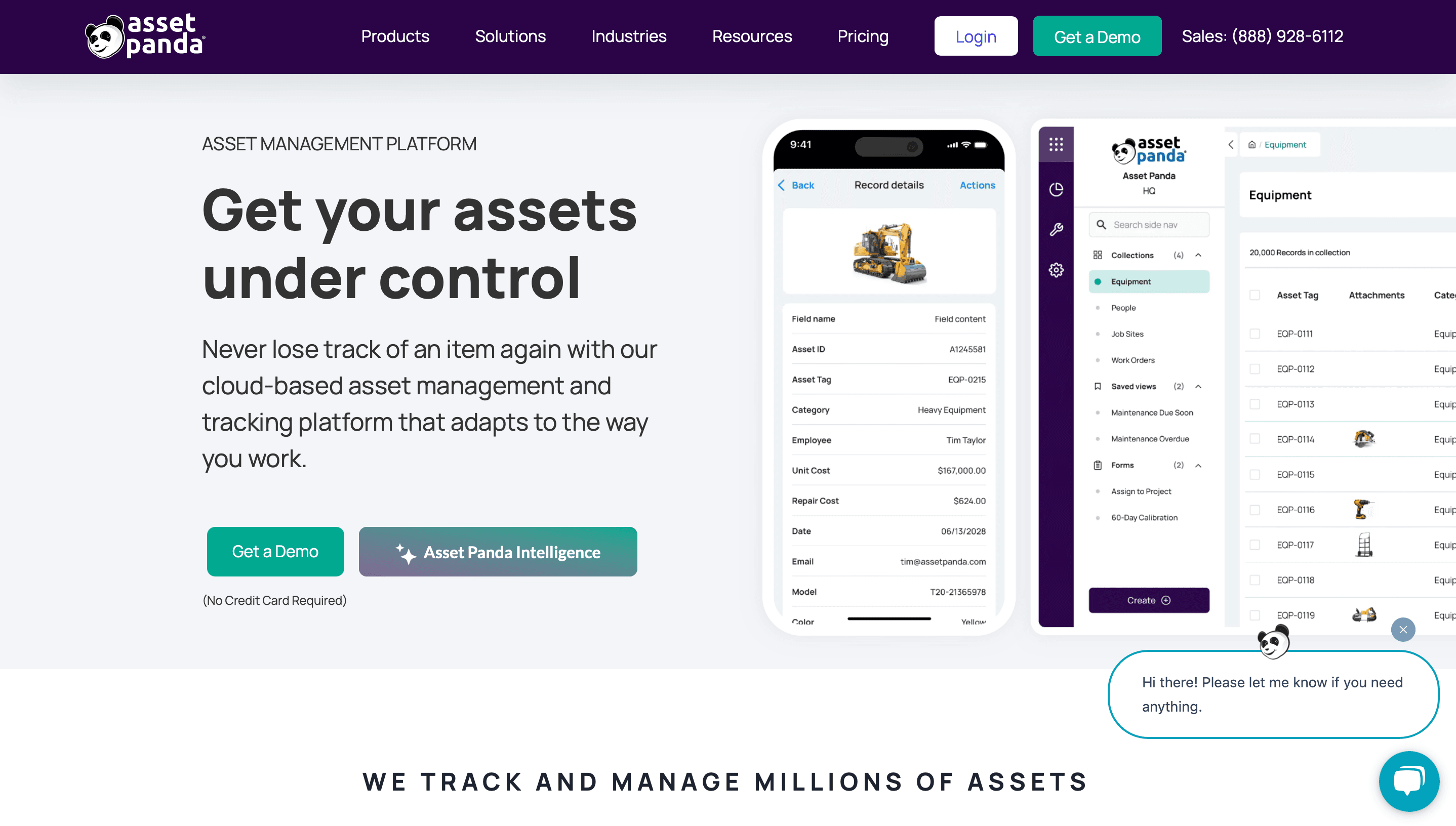
Asset Panda
Asset Panda is all about customization. It gives unlimited users full control over workflows, reports, and mobile tracking—without code.
Features:
- Mobile-first with GPS and barcode scanning
- Unlimited users across all plans
- Automated maintenance alerts
Pros:
- Excellent for field asset tracking
- Easy to tailor without technical skills
- Strong mobile app support
Cons:
- Can be slow with large datasets
- Reporting features could be more robust
Pricing: Starts at $1500/year for <500 assets. Most customers pay $2500–$3000/year.
Best for: Field-heavy teams in healthcare, education, or construction that need mobile-first flexibility.
8. Flexera IT Asset Management
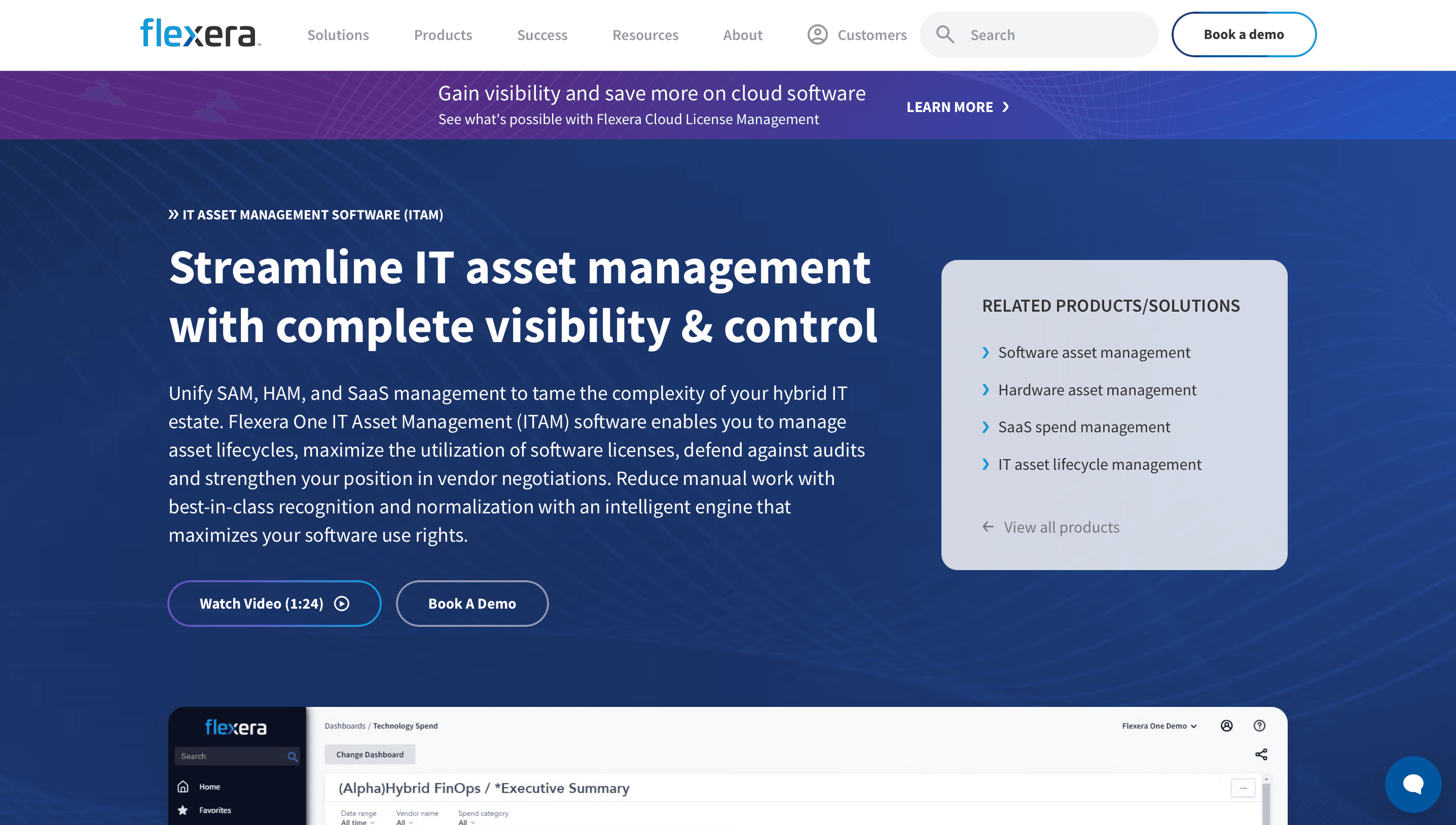
Flexera
Flexera One is built for complexity. It connects the dots between on-prem software, SaaS, and cloud workloads—and helps you optimize all of it.
Features:
- License library with 2.1M+ software use rights
- Cloud cost optimization and automated rightsizing
- Custom dashboards and audit readiness
Pros:
- Deep license intelligence and audit prep
- Hybrid cloud and SaaS visibility
- Delivers quick ROI in large environments
Cons:
- Not suited for smaller orgs
- Setup and data normalization require time
Pricing: Starts in the five-figure range. ROI typically within 6–12 months.
Best for: Enterprises with sprawling IT estates and global teams that need clarity—and savings—across hybrid environments.
9. Ivanti ITAM
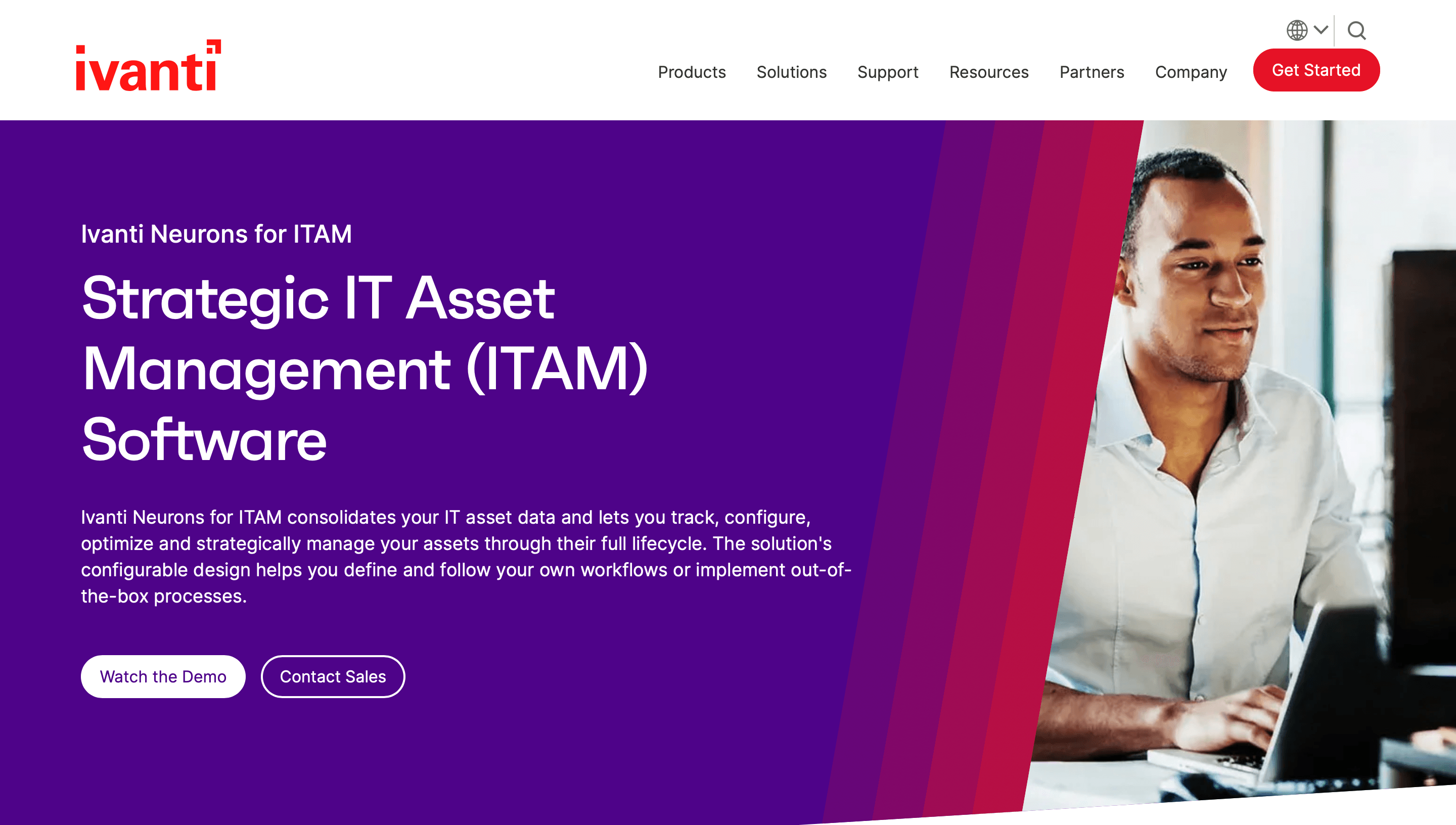
Ivanti
Ivanti merges traditional asset tracking with AI. Its Neurons platform brings active scanning and smart automation to your lifecycle workflows.
Features:
- Real-time tracking for servers, cloud, hardware, and software
- Mobile app with barcode scanning
- Threat detection and compliance baked in
Pros:
- Strong security-focused asset management
- AI-based automation to reduce manual work
- Integrates with broader Ivanti ecosystem
Cons:
- Slightly fragmented UI between modules
- Cost can escalate with multiple add-ons
Pricing: Around $50–$60 per endpoint/year for add-ons. Cloud pricing: $4.20/user/month.
Best for: Medium to large enterprises seeking strong asset visibility with security baked in.
10. Sapphire
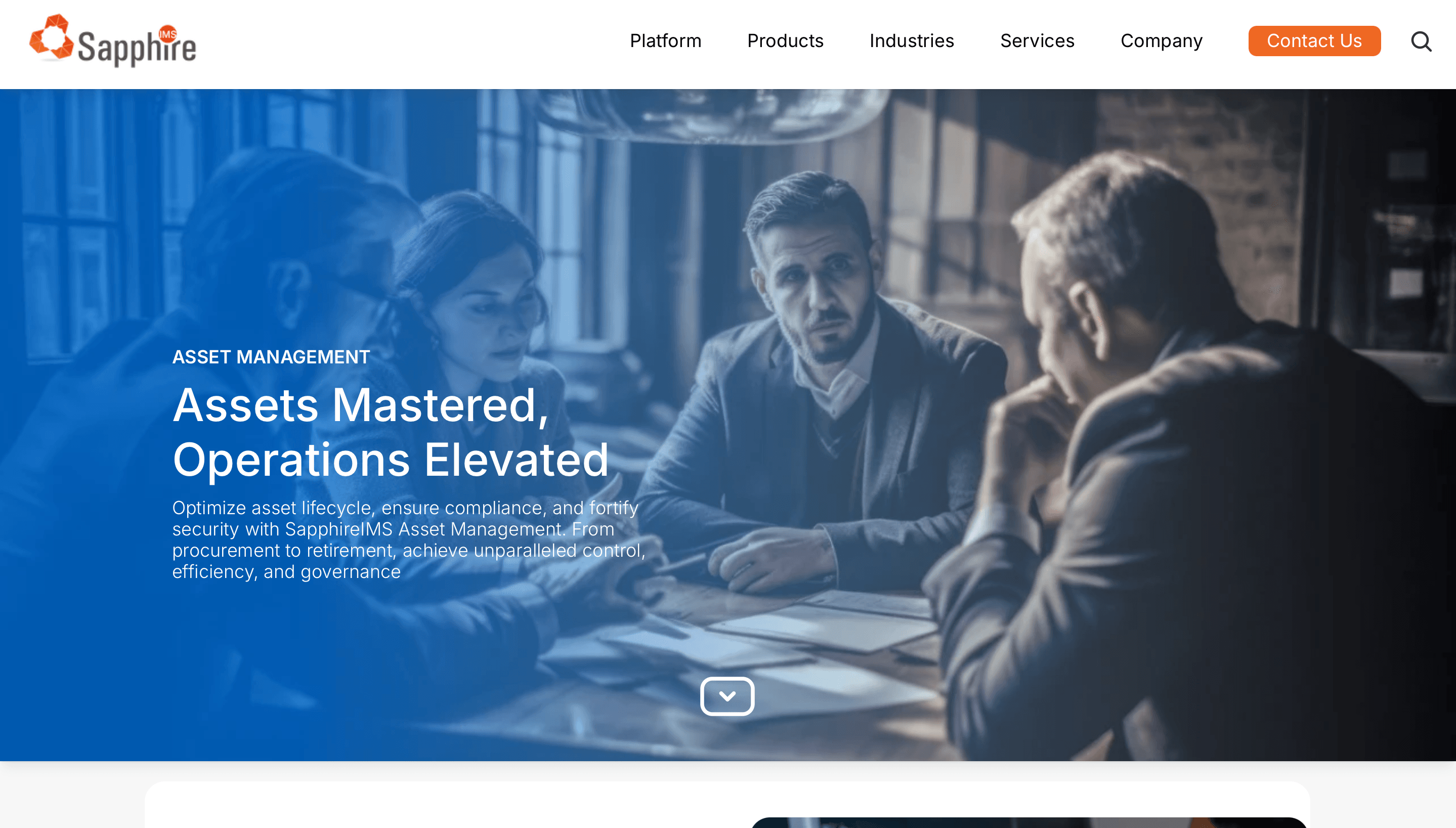
Sapphire
Sapphire uses AI and NLP to simplify ITAM. It offers live tracking, role-based access, and a user-friendly helpdesk for service requests.
Features:
- Cloud or on-prem deployment options
- Smart audits and preventive maintenance
- Remote access and updated inventory
Pros:
- Simple setup for small to midsize orgs
- Strong language-based query and search
- Budget-friendly for growing teams
Cons:
- Limited integrations with third-party tools
- Reporting is basic compared to bigger platforms
Pricing: Starts at $15/month. Free trial available without a credit card.
Best for: Growing companies with light service desk needs, moving away from spreadsheets.
11. Asset Sonar
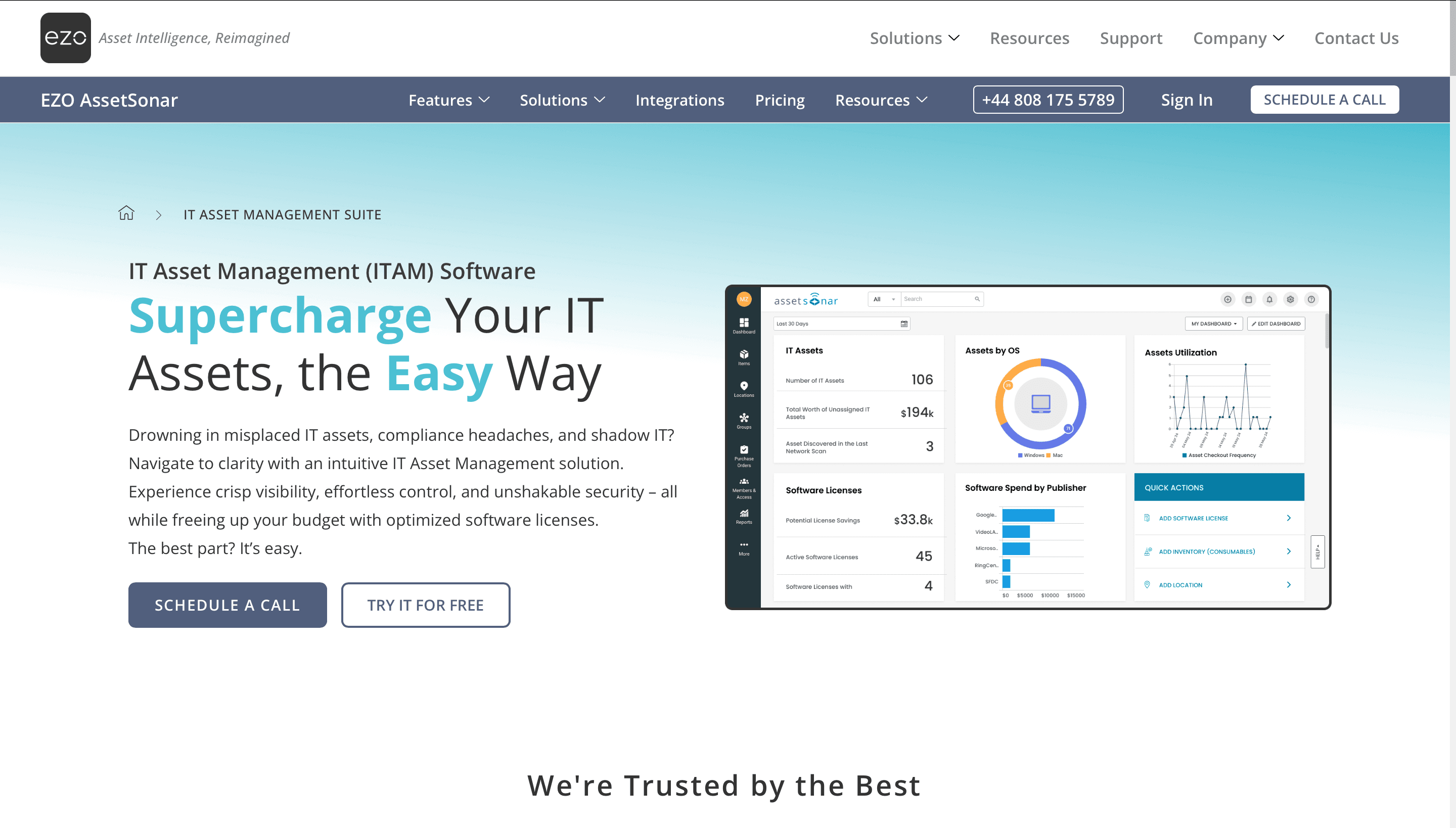
AssetSonar
Asset Sonar focuses on visibility—whether your gear is in a single office or spread across regions. It’s simple, fast, and built for scale.
Features:
- Auto-discovers devices with minimal setup
- Tracks assets and licenses across locations
- JAMF Pro integration for Apple environments
Pros:
- Great for distributed teams with remote devices
- Quick onboarding and strong support
- Clean, modern interface
Cons:
- Limited advanced reporting
- Admin-based pricing can get costly as you scale
Pricing: $49.99 per admin/month + $0.20/item. Includes barcode scanning and SAML/LDAP support.
Best for: Teams managing distributed hardware/software environments who want instant clarity without heavy lift.
How to Choose an IT Asset Management Software
Choosing the right ITAM software isn’t just about checking boxes—it’s about solving the chaos behind the curtain. Whether it’s ghost assets, scattered spreadsheets, or license sprawl, the tool should match how your team actually works. It should scale with your growth and offer real-time clarity, not just static reports.
1. Map Your Asset Workflow
Look at how assets move across your environment—from purchase to deployment, updates, transfers, and finally retirement. A solid ITAM tool should fit into that journey, not force you to change it. Choose a platform that lets you automate routine steps and adapt to changing workflows without needing a developer.
2. Consider All Asset Types
You're not just managing laptops. Between mobile devices, cloud workloads, SaaS tools, and on-prem hardware, your platform should track it all—ideally in one dashboard. If you’re juggling both digital and physical assets, make sure the tool offers flexible grouping and reporting for each type.
3. Prioritize Your Critical Assets
Every business has a few assets that are mission-critical—whether it's servers in healthcare or software in finance. Your ITAM tool should let you tag and monitor these closely. Bonus if it includes risk scoring, compliance flags, or maintenance alerts tied to high-priority equipment.
4. Inventory Should Be Tight
Accurate inventory isn’t a luxury—it’s the baseline. You should know where each asset is, who’s using it, and what it’s costing you. Tools with auto-discovery, audit trails, and license tracking save you from nasty surprises during renewals or security reviews.
The right ITAM tool won’t just show you what you own—it’ll show you what matters. Once you’ve nailed down your workflows, asset types, and priorities, picking a platform becomes a strategic move—not a shot in the dark. Because when your asset data is clean, your decisions are too.
ITAM Software Comparison at a Glance
Choosing the right ITAM tool isn’t just about features—it’s about fit. Whether you're juggling SaaS sprawl or tracking laptops across global offices, the right software should align with your operations, not complicate them. Here’s a side-by-side look at 11 top contenders, boiled down to what really matters.
| Software | Key Strengths | Pricing | Best For |
|---|---|---|---|
| Teqtivity | Custom workflows, remote-friendly, deep integrations | $72/user/month | Flexible, remote workforce management |
| Zluri | SaaS discovery, automation, compliance tools | $4–$8/user/month | SaaS-heavy orgs reducing software costs |
| ManageEngine | CMDB, license tracking, agentless scanning | $955/year (250 assets) | ITAM + compliance tracking |
| SolarWinds | Asset + incident management, risk alerts | $39–$99/tech/month + device fees | ITSM + ITAM in one platform |
| ServiceNow | Full ITSM integration, cloud + hardware tracking | ~$100/user/month | Large enterprises on ServiceNow stack |
| IBM Maximo | IoT & enterprise asset tracking, predictive maintenance | Custom pricing | Industrial & enterprise infrastructure management |
| Asset Panda | Mobile-friendly, barcode support, flexible templates | $1500+/year (based on assets) | Field teams and physical asset tracking |
| Flexera One | Deep software license insights, hybrid cloud tracking | Custom pricing | Enterprises managing software compliance & spend |
| Ivanti Neurons | Real-time discovery, patch + asset management | Custom pricing | Enterprises with high automation needs |
| SapphireIMS | Unified ITSM/ITAM, Indian market focus | ₹50,000/year+ (approx.) | Mid-sized companies in APAC |
| AssetSonar | Specialized for hardware/software tracking, audits | $69+/month | SMBs with audit and compliance focus |
There’s no one-size-fits-all winner here—only the right choice for your environment, budget, and IT maturity. From lean setups to full-scale enterprise rollouts, pick the tool that’ll help you see clearly, act quickly, and stay compliant without the chaos.
Final Take: Choose the Right ITAM Tool for You
The right ITAM software can transform how you manage IT assets—cutting waste, reducing risk, and saving up to 30% on software spend. From real-time tracking to compliance automation, the tools we covered offer a range of strengths tailored to different business needs.
Teqtivity excels in workflow flexibility, while Zluri is a powerhouse for SaaS-heavy environments. ManageEngine AssetExplorer is a solid entry point for growing teams, and ServiceNow brings serious firepower for large enterprises. Tools like Asset Panda offer great value for mobile-first operations with unlimited users.
Choosing the right platform starts with knowing your pain points. Struggling with license sprawl? Spreadsheet fatigue? Compliance worries? Let those guide your pick.
Also consider integration ease, mobile support, and scalability. The best ITAM tools adapt to your workflows—not the other way around.
Beyond inventory tracking, ITAM software helps you get more value from your tech—extending hardware lifecycles, avoiding license waste, and boosting negotiation power. The upfront investment pays off fast in savings, visibility, and peace of mind.
Which platform will help you take control of your IT costs and scale smarter in 2025?
Build trust and prevent breaches with UprootSecurity — making GRC the key to good security. → Book a demo today
Frequently Asked Questions

Robin Joseph
Senior Security Consultant
